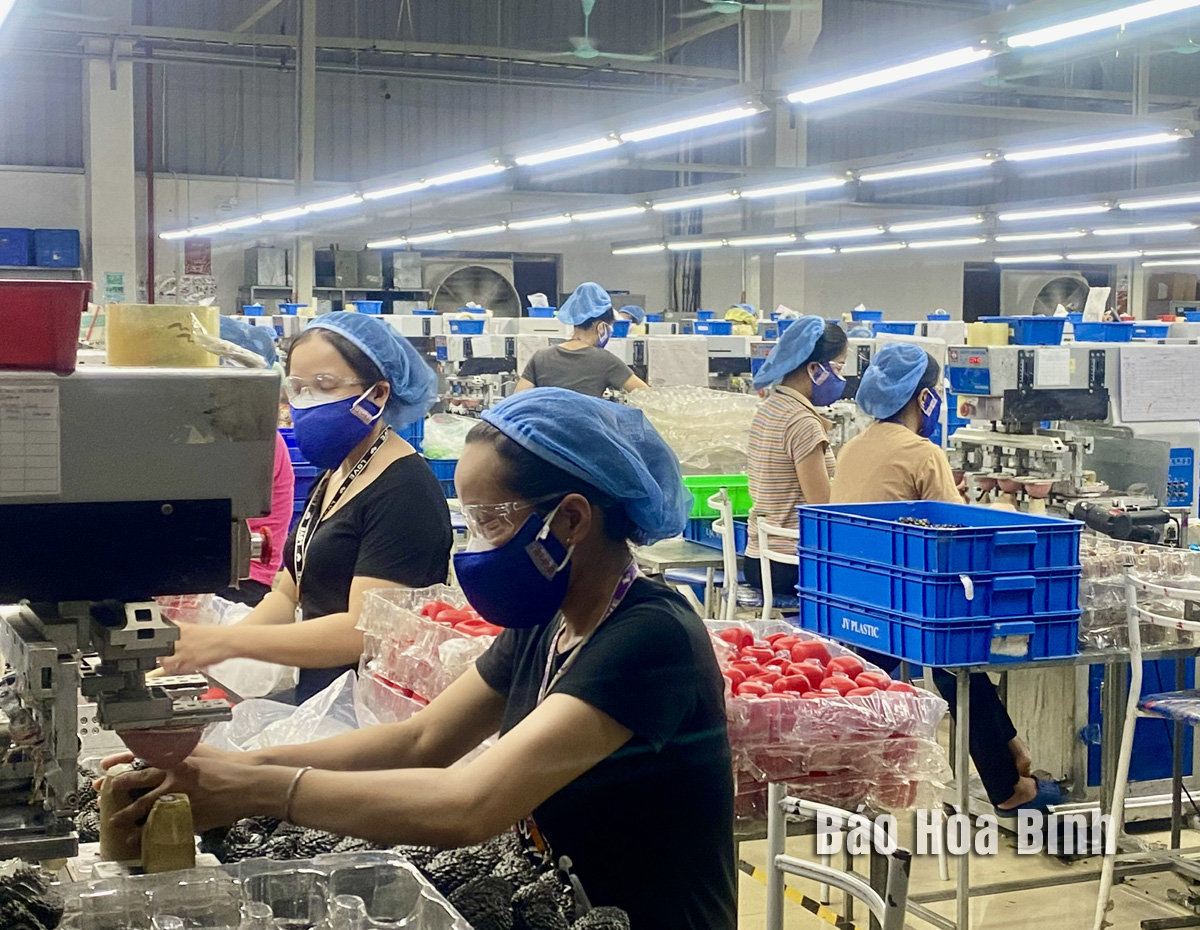
Outside the key economic region of Hoa Binh, yet Lac Son district has utilised its potential and strengths regarding labour, land, and transportation connectivity to attract investment to the locality, contributing to promoting socio-economic development.
PLac Son district actively attracts investment to promote industrial development and create jobs for labourers. Lac Son Plastic Co., Ltd generates jobs for about 1,300 local labourers.
Chairman of the district People’s Committee Bui Van Linh mentioned the advantages of the locality, saying that Lac Son boasts transportation and labour strengths, and large land for developing agriculture, forestry, industry, and services.
With a rich cultural heritage deeply rooted in the Muong ethnic identity, abundant historical and cultural relics, as well as unique local specialties and cuisine, Lac Son boasts great potential for tourism development.
The northeast communes of Mien Doi and Quy Ho, and the southwest communes of Ngoc Son and Tu Do have a mild climate, beautiful natural landscapes, and a forest coverage of over 50%, making them suitable for resort and eco-tourism development.
Apart from well-known destinations like Mu waterfall in Tu Do commune and Thung hill in Quy Hoa commune, many investors and enterprises have confidently poured money in eco-tourism projects and high-end eco-resort urban areas.
Over the recent years, Lac Son district has paid heed to strengthening investment promotion activities and proactively seizing opportunities to attract capital from domestic and foreign investors.
Moreover, the district has rolled out a red carpet for investors through efforts to speed up administrative reform, improve investment and business environment, and ensure the land clearance progress.
In 2023, the district had four more investment projects approved by the provincial People's Committee, lifting the total number in the locality to 37 worth over 12 trillion VND. These projects cover a combined area of 732 ha. As many as 20 out of these projects were completed and put into operation.
Currently, some investors are proposing to conduct surveys to develop projects with a total area of nearly 2,500 ha in the locality. Bui Van Linh said that businesses and investors have significantly contributed to promoting the district’s socio-economic development, and bringing vitality to all aspects.
The unemployment rate in rural areas has decreased, while the number of local labourers finding employment locally is increasing. Last year, the district’s per capita income reached 60 million VND (nearly 2,400 USD), leading to a reduction in the poverty rate by 4.32%.
Hoa Binh province’s economy posted an impressive Gross Regional Domestic Product (GRDP) growth rate of 12.67% in the first quarter of 2025, representing a 12.76% year-on-year increase, the highest rate recorded since the beginning of the current tenure, according to the provincial Statistics Office. This robust growth reflects years of strategic groundwork and sets a strong foundation for the province’s annual growth target of over 10%.
With a focus on cash crop farming with science - technology application and brand building, Lac Thuy district is gradually increasing production value, improving people's life quality, and laying the foundation for sustainable socio-economic development.
In recent years, the economic development model "Hoa Binh Earthworm Farm” run by Mr. Bui Van Dang in Co Giua Hamlet, My Thanh Commune (Lac Son district) has not only brought stable economic value but it is also environmentally friendly, helping to protect and reduce pollution, contributing to the construction of a green and sustainable agriculture.
Dao Village’s honey – a product certified with a 3-star OCOP (One Commune One Product) rating by Thong Nhat Agricultural Cooperative in Dao Village (Hoa Binh City) – is highly regarded by consumers for its quality, richness, and variety in packaging. The distinctively sweet taste of Dao Village’s honey leaves a lasting impression on anyone who has tried it.
In alignment with Project No. 07-DA/TU, issued by the Hoa Binh provincial Party Committee on November 1, 2021, Lac Thuy district has actively promoted investment and supported the sustainable development of its industrial and handicraft sectors during the 2021–2025 period. Alongside this, the district has remained committed to preserving and revitalising traditional craft villages.
Located in the northern part of Lac Thuy district, with a temperate climate and fertile soil, Phu Thanh commune has great potential and advantages in growing tea. The long-standing experience, combined with strict adherence to organic farming practices in the tea gardens, ensures that the dried tea products from Phu Thanh and Lac Thuy as a whole are sold out immediately upon production, providing a stable and prosperous life for the local people.



